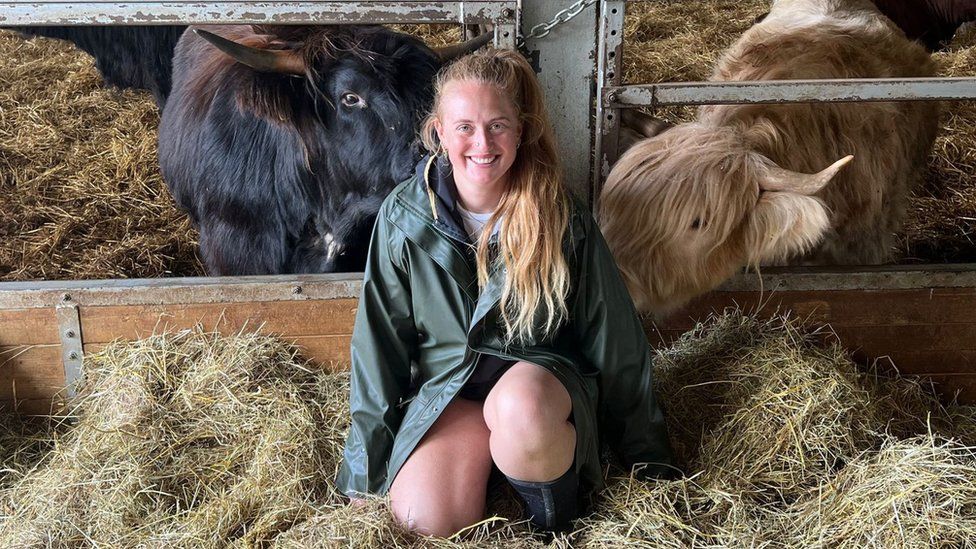Weather, cost of living and climate make life tough for young farmers
- Published

Farming can be a rewarding life, but it can also be hard. And young farmers today say they face more challenges than ever.
The biggest one right now is rain. Parts of England had the wettest July on record, leaving some farmers struggling to sustain their cattle.
For Izzi Rainey, the poor weather has meant she hasn't been able to make the hay that her cattle need.
The 31-year-old usually makes her own cattle feed but says she may be forced to buy it this year - a worry because of the potential costs.
"I don't know what I'll do if it comes to that," she says, speaking to BBC Newsbeat from her farm in Norfolk on a day when weather warnings are in place for rain.
Experts say with climate change causing more changeable weather, farming will have to adapt or risk further losses.
"It's so unpredictable," says Izzi. "Your whole life becomes based around the weather."
The cost-of-living crisis has also hit farming, and as her costs go up Izzi's been balancing multiple jobs to supplement her income.
"The financial side of it causes a lot of stress," she says.
"It gets really tiring constantly adapting, every plan you make goes to pot."
Mike Wilkins is the young farmers' ambassador for the National Farmers' Union (NFU) and says Izzi is far from alone.
The 28-year-old says he "would do anything" to control the weather, and too much rain could have a "really, really dramatic" impact.
"It will ruin crops to the point that we can no longer harvest them and then you lose all of the value of the crops," says Mike, who farms on the Marlborough Downs in Wiltshire.
But it's not just the rain, as last year farmers had to face the opposite problem - drought.
It meant a lot of the produce hitting supermarket shelves was smaller than usual.
'Managing risks'
Although it's not clear how much of the rain is due to climate change, scientists say extreme weather events will be more severe in a warmer world and farmers need to consider their resilience.
"I think it's a hard time to be in the sector with the climatic conditions we're experiencing at the moment," says Prof Nicola Cannon from the Royal Agricultural University.
The university has a course which includes learning from farmers around the world about cultivating land in different climates and weathers.
Nicola believes technology will play a greater role in the future, with things like "learning to use weather forecasting systems better or probes you can put in bales to check the moisture".
"It's about managing and understanding the risks with the tools that are available," she says.
One of the keys is to embrace flexibility, Nicola says.
She suggests "making hay while the sun shines". But like many others, Izzi is restricted by agreements to improve biodiversity.
Farmers can sign up to receive grants in return for not harvesting before July to allow for plants to flower and set seed.
Izzi says she supports such schemes but thinks they should be more flexible in the future, adding if she'd been able to cut the hay in June she "wouldn't be in this situation now".
"We're going to have to become more adaptable," she says.
Mike says farmers everywhere are feeling the impact of unpredictable weather but, despite the challenges, he feels it's an "incredibly exciting" time to be in the job.
"Young people really understand the importance of having a positive impact on our climate and our environment, while also producing really great high quality food," he adds.
Related Topics
- Published2 August
- Published2 August
- Published24 July
- Published22 June
- Published18 August 2022
- Published29 July 2022